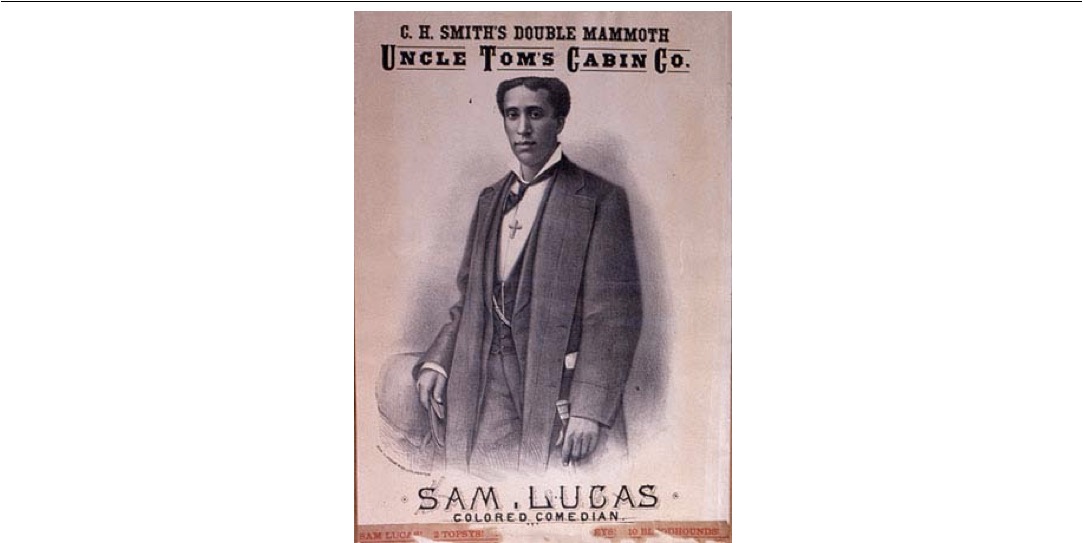On this day in comedy on August 7, 1839 Comedian, Actor, Singer, Songwriter, Sam Lucas (born Samuel Mildmay Lucas or Samuel Lucas Milady) was born in Washington Court House, Ohio!
Sam Lucas began his career as a black-faced minstrel in 1858. His parents were freed former slaves and young Sam took advantage of his enviable position during the Civil War and gained employment where there was pay and not the fate his Southern counterparts experienced on plantations. Lucas worked as a barber while practicing guitar and vocals.
The diligence paid off. Sam Lucas was a minstrel pioneer. As a composer he was one of the first black men to fuse established white songs with African-American rooted musical devices. He would sing his subversive tunes on stages and riverboats and as minstrelsy grew so did the stature of Sam Lucas. He became a celebrity not only for his music, but also for his comedic portrayals of the characters he sang about; sad, pitiful, downtrodden personalities, but ones with hope. Black people the way white people wanted to see them back then, minus the hope part.
Sam Lucas is recognized as the first black man to play Uncle Tom in Uncle Tom’s Cabin on stage and in film. The latter was his last work. Due to his comedy versatility as well as musically and dramatically, Lucas came to be known as the “Grand Old Man of the Negro Stage.” From 1871-1879 he traveled throughout the country with various minstrel troupes including a tour in Havana, Cuba. Once he left minstrelsy Lucas performed in vaudeville.
Musical dramas and comedies were fine, but blackface paid the bills and after a play or two Lucas was back to smearing on burnt cork. At least he worked with the best. In 1876 he toured with Sprague’s Georgia Minstrels. His fellow performers were black faced legends Billy Kersands and James Bland. This was authentic black minstrelsy. Most of the time whites played black roles. For instance, Lucas signature role as Uncle Tom had traditionally been played by Caucasian actors in blackface. Lucas’ casting in 1878 changed all that. Unfortunately, the production was a flop.
Lucas went back to blackface. He also composed; lyrics and songs more militant than those of most black writers of the time. He wrote of remembering freedom and the joyful memory of the day he was set free. During this period Lucas grew tired of minstrelsy. The 1890 production of Sam T. Jack’s The Creole Show gave him that opportunity. It was an all-black production; one where he met and married his wife. They traveled together on stages in variety houses and vaudeville. He distanced himself from minstrelsy even further in 1898 when he did Bob Cole’s A Trip to Coontown. It was the first black production to use black writers, director and producers. It truly was all-black and devoid of minstrelsy.
Artistically the turn of the century was good for Lucas. He worked under the direction of famed ragtime composer, Ernest Hogan from 1905-06. In 1907 he worked again for Bob Cole when the team of Cole & Johnson staged the musical comedy, The Shoe Fly Regiment. Once that ended Lucas jumped into another one: The Red Moon playing the part of – a barber. He was a member of the theatrical club, The Frogs and starred in films. One of his movies was the never finished Lime Kiln Field Day in 1913. (It was preserved by the Library of Congress in 2014). In 1914 he revived his role as Uncle Tom with decidedly better results for the film version. The stumbling block was Lucas’ health. He’d suffered liver disease for many years and then he contracted pneumonia while filming and died soon afterwards on January 5, 1916.
By Darryl “D’Militant” Littleton
Check out this clip:


